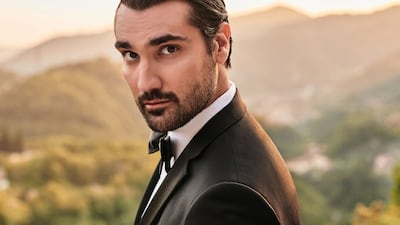Crafting an enchanting repertoire is like building the perfect DJ set, according to opera star Jonathan Tetelman.
The American-Chilean tenor says his time spinning tunes in New York helped him polish his stirring performances as a leading talent among a new generation of opera singers. Tetelman cites his thunderous take on Puccini’s Nessun Dorma as an example of how his time behind the decks informed his performances on the grand stage. Praised by critics for its drama and crystalline notes, Tetelman's version is reminiscent of the late Luciano Pavarotti, who made the aria his own.
“I built my technique to sustain the aria, and now I’ve reached a point where I can actually have fun with it,” Tetelman says. “I can change my interpretation each time, based on how I feel in the moment, the emotions I want to convey, or even the energy of the audience. The tricky part is that you can’t enjoy it too much while singing – if you do, you risk losing the technical balance that always has to be there.”
Speaking to The National ahead of his Abu Dhabi Festival performance at Emirates Palace on Friday, Tetelman says it is almost like DJ-ing.
“You have to be present in the moment and read the room. On stage, I’m communicating with the audience through the conductor, which allows the performance to rise and fall naturally – much like a DJ set,” he says.
Tetelman, 37, enjoys drawing on lessons from his unconventional path to the opera world. Born in Chile and adopted by American parents, he sang in his school choir from the age of 10 before trading the classical discipline for guitar, becoming the lead singer of a rock band in high school. At university, alongside his vocal training at the Manhattan School of Music, he had a side gig as a DJ in a local nightclub.
“When I was younger, I was much more shy, more reserved. Then I became a DJ and nightclub promoter in New York City, and that pushed me to come out of my shell,” he says. “Honestly, that’s exactly what you need – you have to be able to reflect emotions and embody the music without hesitation.
“With electronic music, I loved how dynamic it sounded, how it could take people on a journey through different emotions. The tracks have this innate sense of tension and release.”
Reflecting on his decision to pursue opera, initially as a baritone, Tetelman says he was drawn to the deep commitment it demanded.

“It gave me the discipline I never really had with anything else and it is truly a reflection of me that felt completely authentic because it’s my voice, my body, my instrument,” he says. “So many people wish they had a great voice or the time to develop one, and I was lucky to have both. It would be a waste of my gift if I didn’t take it as far as I could.”
Tetelman’s focus led him to win first prize at the prestigious New York Lyric Opera Theatre Competition in 2017, followed by a growing number of international engagements with companies such as London’s English National Opera, Germany’s Oper Frankfurt, and Barcelona’s Gran Teatre del Liceu.
A major aspect of his rise has been his interpretation of Puccini’s operas, whether as Rodolfo in La Boheme or Pinkerton in Madama Butterfly. Such is his confidence with the material that he released his album, The Great Puccini, in 2023, a year ahead of the centenary commemorations of the composer’s death.
“I never thought of myself as a Puccini tenor when I was younger, but as I got older and my technique evolved, my interest in the composer naturally grew. I really found myself as both a singer and an actor in his music,” he says. “The wonderful thing about Puccini is that everyone can understand the emotions in his music. Everyone can connect with it. It’s not so cerebral or technical that it creates a barrier. Instead, Puccini has this unique quality where you are constantly immersed in emotion, whether through the character or the music itself.”
With more European shows ahead before returning to the studio to record another classical album in October, Tetelman feels fortunate to have the kind of schedule usually reserved for veteran artists. That said, he has not forgotten those late nights in clubs that, in part, shaped his craft.
Time permitting, he hopes to work on an electronic music album featuring operatic vocals. “It's with a friend I met while performing in Austria, and he’s a DJ,” he says. “We were actually talking about doing a collaboration, maybe three or four tracks, blending movie music with a DJ edge and a classical tenor voice. We have some ideas floating around.”
Jonathan Tetelman and The New Japan Philharmonic Orchestra perform on Friday at Emirates Palace Mandarin Oriental, Abu Dhabi; doors open at 8pm; tickets start at Dh100



